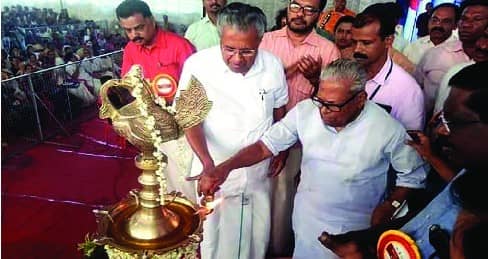Migrant workers are a special feature of the economy of Kerala.

The state has both high outward and inward migration of labour. While there’s a lot of attention paid to outward migration and its economic implication, inward migration is a relatively less explored. For Keralites, migration to the Gulf, Arab countries and Europe provide financial benefits. Additionally, the migration of Keralites to different places of India, particularly, to the metropolitan cities is also high.
Context
Immediately after independence, the economy of Kerala did not look promising. Its society was caste-ridden and was economically fragmented. The production level was also low. From the late 1960s, a sizeable percentage of the state's population started migrating to the oil-rich countries of West Asia in search of employment. In those economies, there was a significant demand for semi-skilled and skilled labour in the construction sector and other sectors linked to the oil industry. The earnings of a worker in those countries were much higher and a large amount of remittance money flowed back to the southern Indian state, changing its economic condition from the 1970s.
Population growth has been negative in many states of India and Kerala is one of them. Population growth in two of the 14 districts in Kerala has turned negative. Additionally, the number of elderly population is increasing. The proportion of those who are aged 60 and above increased from 6% in 1961 to 13% in 2011 and the trend is expected to be similar now. So, the supply of labour in Kerala is less than its requirement. This is the main driving force behind inward migration of labour to Kerala. At the same time, the minimum wage rate is much higher as compared to other Indian states. This is the main pull factor for migration to Kerala. Migrants come from over 195 districts spread across 25 states.
Benefits
This story is from the March 16-31, 2019 edition of BUSINESS ECONOMICS.
Start your 7-day Magzter GOLD free trial to access thousands of curated premium stories, and 9,000+ magazines and newspapers.
Already a subscriber ? Sign In
This story is from the March 16-31, 2019 edition of BUSINESS ECONOMICS.
Start your 7-day Magzter GOLD free trial to access thousands of curated premium stories, and 9,000+ magazines and newspapers.
Already a subscriber? Sign In

Deposit shortage: challenges facing India's banking ecosystem
In any macroeconomic framework, the household sector plays a critical role as a driver consumption, savings, and overall economic activity.
India's future dreams in Semiconductors & AI
A midst the gloom of the RG Kar affair or the Tirupati laddu scam or even the continued terrorist attacks in Jammu & Kashmir, even after the completion of the first general election in the state, we find hope and encouragement when the founder of Nvidia, Jensen Huang, in his recent visit to India says \"India will be a gigantic opportunity for us\".

The Ramayana: Justice and Modern Man
Consisting of Twenty-Four Thousand worthy Sanskrit verses, the Ramayana is one such epic, which provides a pathway to one committed to justice to establish himself as an ideal human being by following the exemplary life of its hero.

Vallabhbhai Patel: A Sardar of Farmers, A Matchless Social Reformer and the Maker of United India
Sardar Vallabhbhai Patel was instrumental in unifying the princely states to form the Union of India.

Understanding Prosperity: NOBEL Prize awarded for groundbreaking research on institutions and economic development
The Royal Swedish Academy of Sciences has awarded the Memory of Alfred Nobel to three US-based economistsDaron Acemoglu, Simon Johnson, and James A. Robinson\"for their studies on how institutions are formed and affect prosperity.\"

Sinking Resources: Groundwater crisis and sustainable solutions in Kolkata
Kolkata's underground water crisis is becoming a serious issue, driven by rapid urbanization and the construction of high-rise buildings.

Tourism Industry positively impacted by the festive season
Diwali transforms streets into a spectacle of festive lights, Diwali transforms streets into olis, and families gearing up for grand celebrations.

RBI's Shift to a Neutral Stance: Signaling a New Phase in Monetary Policy
For over a year, the Reserve Bank of India (RBI) has taken a firm stance against inflation, raising interest rates by 250 basis points between May 2022 and February 2023 in response to post-pandemic price pressures.

UK Budget
There _ he latest UK budget represents a departure from previous fiscal documents.

Han Kang's Historic Nobel Prize Win
The 2024 Nobel Prize in Literature has been awarded to T South Korean writer Han Kang, 53, known for her works including The Vegetarian, The White Book, Human Acts, and Greek Lessons.